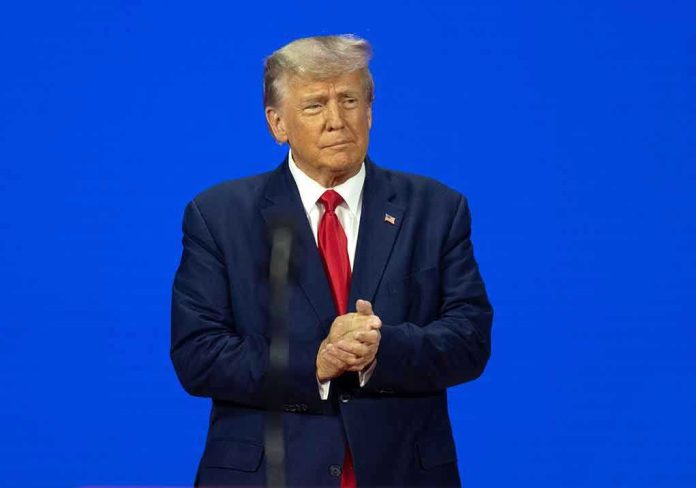
President Trump’s push to send U.S. troops into Mexico was flatly rejected, exposing a heated clash over border security and cartel violence that strikes at the heart of American sovereignty and safety concerns.
Story Highlights
- Mexican President Sheinbaum refused Trump’s offer of U.S. military intervention against drug cartels, citing sovereignty.
- Trump publicly claims Sheinbaum’s rejection is rooted in fear and weakness, intensifying U.S.-Mexico tensions.
- Cartel violence and illegal immigration remain critical threats along the southern border with no cross-border military cooperation.
- The confrontation marks the first major diplomatic test between Trump’s administration and Mexico’s new government.
Trump’s Offer and Sheinbaum’s Refusal: A Clash of Security and Sovereignty
President Donald Trump directly offered Mexican President Claudia Sheinbaum U.S. military assistance to target violent drug cartels operating near and across the southern border. Sheinbaum immediately refused the intervention, insisting on Mexico’s right to manage its own internal affairs. She emphasized that while cartel violence threatens both nations, Mexico would not permit foreign troops to operate on its soil, arguing that sovereignty must take precedence over external military pressure. Trump later characterized Sheinbaum’s stance as one of fear, framing her refusal as a weakness that puts American lives and border security at greater risk.
Sheinbaum’s rejection of direct U.S. troop involvement did not resolve ongoing tensions. Instead, it sparked a public debate in both countries about the best way to confront cartel violence and address the surge of illegal immigration. Trump’s administration maintains that the severity of the crisis demands decisive action, including cross-border operations if necessary. Sheinbaum, however, has proposed enhanced bilateral cooperation—such as intelligence sharing and joint law enforcement efforts—without allowing military boots on the ground. This diplomatic impasse continues to fuel frustration among conservative Americans who see cartel violence as a grave threat and view Mexico’s position as an obstacle to effective border security.
Border Security, Illegal Immigration, and the Conservative Response
Trump’s supporters, particularly those concerned with constitutional rights and national security, see the refusal as a direct threat to American interests. They argue that the unchecked flow of drugs and illegal immigrants undermines family values, economic stability, and local communities. The absence of military action leaves many border residents vulnerable to cartel activities, while the debate over sovereignty is viewed as secondary to immediate public safety. Conservative voices call for stronger measures, including enhanced border patrols, tougher immigration laws, and, if necessary, a reevaluation of diplomatic relations with Mexico to prioritize American security first.
Despite the public confrontation, both governments have attempted to maintain open channels for dialogue. In September 2025, diplomatic exchanges continued, focusing on alternative forms of security cooperation. However, the core disagreement over the presence of U.S. troops in Mexico remains unresolved. Trump insists on the necessity of direct intervention to dismantle cartel operations, while Sheinbaum’s administration stands firm on rejecting any perceived infringement on national independence. This standoff not only shapes the immediate response to border threats but also sets a precedent for future U.S.-Mexico relations under the current administrations.
Diplomatic Fallout and Future Implications for U.S.-Mexico Relations
The dispute has broader implications for trade, security, and constitutional principles. As both governments seek to assert their priorities, American conservatives remain vigilant against policies they perceive as weakening the nation’s defenses or eroding traditional values. The confrontation between Trump and Sheinbaum underscores the ongoing struggle to balance national sovereignty with the urgent need to combat transnational crime. For many in the U.S., the outcome of these negotiations will signal whether American leadership is willing and able to protect its citizens from external threats without compromising constitutional rights or family stability.
Mexican president is 'scared' to have US troops target cartels, Trump says https://t.co/hrIO1ygxyy pic.twitter.com/iZRYQCz43C
— American Military News (@AmerMilNews) September 4, 2025
As cartel violence and illegal immigration persist, the lack of military cooperation highlights the difficulty of forging effective international partnerships in the face of conflicting priorities. Conservative Americans will continue to demand accountability and action from their leaders, pressing for solutions that reinforce border security, uphold the Constitution, and defend the values they hold dear.
Sources:
2025 United States trade war with Canada and Mexico
Trump social programs: Mexico’s female president takes stock
‘There won’t be an invasion’: Sheinbaum confident Washington won’t strike cartels in Mexico
U.S. and Mexico reaffirm security cooperation amid tariff tensions



